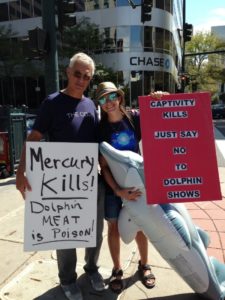
Despite the rallying cry of the environmental movement of the 1970s to ‘save the whales,’ whales are still not safe and continue to face a myriad of threats worldwide. Whales and dolphins are still hunted, captured, and shipped around the globe. These hunts take many forms. The dolphin drive hunts, profiled in The Cove, are a cruel practice that involves the herding of small whales and dolphins at sea where they are then driven and corralled into the confines of a cove in Taiji. After sometimes being held for days within the cove, the dolphins are then slaughtered for meat or kept alive for sale to marine parks and aquaria across the globe. Annual quotas for these drive hunts reach into the thousands, where multiple species including bottlenose dolphins, striped dolphins, Risso’s dolphins, false killer whales and short-finned pilot whales, are killed or taken for captivity.
Large whales are still hunted commercially, and by indigenous groups. Currently, the primary countries conducting some form of commercial whaling include Japan, Iceland and Norway. However, other countries conduct legal whale and dolphin hunts including the USA, Russia, Greenland, Denmark, Canada, and several eastern Caribbean countries. Illegal or opportunistic dolphin hunts occur throughout the Caribbean, South America, western Africa, and south Pacific, among other locations. The meat from these hunts is often eaten, or used as fishing bait.
The capture of whales and dolphins for captivity is another form of whaling. Because the individuals that are removed from wild populations are no longer available to their family groups to breed, pass on knowledge, and support a healthy ecosystem, they are functionally dead whether they survive in captivity or not. The lifecycle of captivity—from capture to transport to confinement in an unnatural environment—feeds a deadly supply and demand chain that causes immense suffering and wreaks havoc on the marine ecosystem.
OPS participates in Japan Dolphin Day on, or near, September 1st of every year. This day of awareness marks the commencement of the dolphin drive hunt season in Taiji, Japan. The goal of this global annual event is to spotlight the killing of dolphins in Taiji and elsewhere in Japan, using positive and informative language to raise awareness to these ongoing hunts.
Learn more about OPS campaigns to address whale and dolphin captivity, hunting, and our support for the development of whale and dolphin sanctuaries.